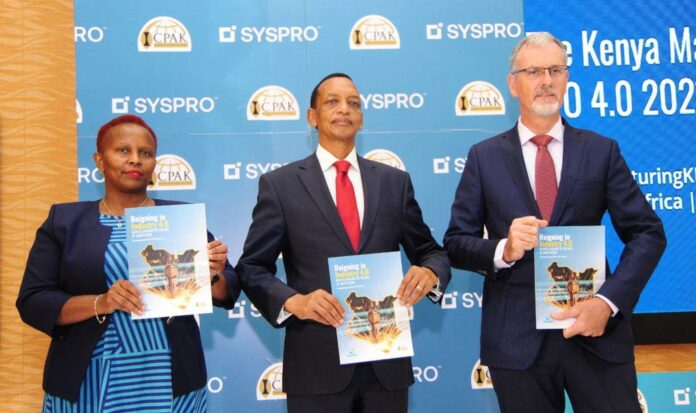Manufacturing Sector in Kenya: SYSPRO, a global enterprise resource planning software provider and the Institute of Certified Public Accountants of Kenya (ICPAK) have released findings from a survey conducted among Chief Financial Officers (CFOs) in Kenya’s Manufacturing Sector.
The inaugural Manufacturing CFO 4.0 2021 Survey was conducted across a range of Manufacturing and Distribution companies in Kenya. It drew over 100 responses from financial leaders predominantly from larger enterprises operating in Kenya.
The survey which assessed sentiments on how manufacturing businesses are faring after an unprecedented and tumultuous 2020, showed only 7% of the businesses surveyed as expressing an “already recovered” trading environment today while 36% of the companies’ surveyed saw 2023 and beyond to be the year in which their businesses will stabilize.
Speaking during the launch of the survey findings, Doug Hunter, Head of Customer and Ecosystem Enablement at SYSPRO Africa noted that the pandemic has prompted the need for diversification and innovation in changing global market policies to help businesses adapt to the ‘new normal’ of the digitized world.
It took me 2 years to get regular customers after starting my business
“While we have seen an expedited global move towards diversification particularly in digital transformation in the manufacturing and distribution sector, Kenya’s uptake has been much slower. The mentality however remains the same: Innovation is essential. Interestingly, as many as 41% of the CFOs surveyed have yet to record their digital return on investments – with 7% not being sure if any were received and 31% still planning on investigating,” said Hunter.
He also noted that, “the return on digital investment comes down to how companies deploy the technology they acquire. It is not how much you spend that matters; it is how you spend it. User experiences can also influence how technology is used and eventually affect the return on investment.”
Also speaking at the launch event, the CEO of ICPAK, CPA Edwin Makori said, “We saw businesses eager to diversify largely favor uptake of enterprise technologies and expectedly, the re-engineering of supply chains to improve business-to-business (B2B) trading come in a close second. While supply chain hurdles are nothing new in the global market, Kenya’s unique position as a primary goods manufacturer means it was hit harder.
Innovation was seen as a likely solution to these hurdles, however, a look at the spending structures of Kenya’s manufacturing companies put the sector on an uneven playing field from a global perspective. Internationally, most companies were able to expand through the help of stimulus, but the survey findings showed 60% of Kenyan businesses are aiming to support new initiatives through direct purchase, dwarfing other means such as 3rd party financiers (38%) and pay for user subscriptions (20%).”
The survey findings also showed while global financial leaders have pushed for expanse through continued expenditure, Kenya has elected to place its faith in older stock. Kenyan Manufacturing sector companies have continued utilizing traditional cost-cutting as their main contingency measure, with the curbing of discretionary expenditure being most prominent at 70.93%, followed by debt collection at 40.70%. Interestingly, and unsurprisingly when the above is considered, the expansion of revenue models only ranks a low third on the cost cutting strategies list at 32.56%.
51% of the CFOs surveyed expressed that managing cashflow remains the biggest business priority for 2022 while 40% felt investing in research and development (R&D) and new products and services are not far behind. What seems to be true is that logistical and resource constraints have, up until now, impeded moves into more future-focused spaces.
In addressing returns on investment on digital investments, it was a bit of a mixed bag with 30% receiving returns and 28% not receiving any returns. The indication, therefore, seems to be uncertainty in the realm of digital returns on investment which does explain its slower uptake across the country. That said, it is important for Kenya to keep at least one eye on this space.
2022 will prove to be a particularly telling year for the state of the Kenyan Manufacturing and Distributions industry. While SMART technologies are unlikely to shift operational fundamentals (as seen in North America and Europe), a new shift is set to start taking hold of management through enterprise technology systems and MRP – a necessary step towards meeting the international mandate for adaptation.
The survey findings revealed that while globally CFOs in the manufacturing sector showed insistence on rapid diversification as a the pandemic’s countermeasure, Kenya’s ability to weather the storm through more traditional means proves that there is no one-size-fits-all solution.
“With the momentum displayed by Kenya’s international peers, the onus is fast becoming one of digital renovation. The world is moving into a digital space so companies must ready themselves for this new era of online agility through the encouragement of digital innovation and literacy. Change may happen slowly, but it must happen nonetheless to stay competitive,” said FCPA George Mokua, ICPAK Chairman.










